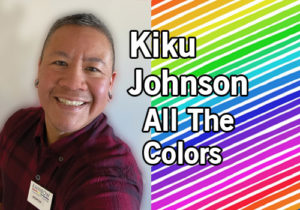Tobacco targets marginalized communities
 CONTRA COSTA COUNTY, CA (May 22, 2022) — I bought the red and white box. It reminded me of my grandparent’s place, and that box certainly made a statement.
CONTRA COSTA COUNTY, CA (May 22, 2022) — I bought the red and white box. It reminded me of my grandparent’s place, and that box certainly made a statement.
I felt like I would only be taken seriously if I were seen sliding out a cigarette from a Marlboro Reds box and lighting up. My way cool college roommate had been smoking them for years.
We were in our first years of college, “finding” ourselves. I was definitely queer and questioning so many aspects of my identity.
The 2017-’18 California Healthy Kids Survey showed that Mt. Diablo Unified School District (MDUSD) lesbian, gay and bisexual middle and high school students use e-cigarettes 1.5-2.5 times more than their straight peers. In California, 1 in 5 gender nonbinary and 1 in 4 transgender students reported using a tobacco product in the past 30 days. In 2018, LGBTQI+ adults in California smoked nearly twice as much (18%) as all adults (9.7%).
Reds were “too intense” for me, so I explored other options and turned to clove cigarettes. Cloves deliver more nicotine, carbon monoxide and tar than traditional tobacco cigarettes. The aromatic fragrance denoted something of difference, much like I was striving to mark my existence, and landed acknowledgement from others.
Clove is distinctively sweet and spicy, with hints of vanilla, just like me. Being Chinese-American, I noticed other folx of color smoking clove cigarettes and believed I had chosen well.
Monument
In Concord, tobacco retailers cluster in lower-income communities of color, downtown and along Monument Boulevard. The tobacco industry lowers prices in areas with more people of color across our state, knowing this makes their products more accessible for underage youth – namely Latine, Black and low-income people. Cigarillo cigars are sold cheaply in Concord with countless flavors and aromas.
The tobacco industry knows they will lose a lot of current and future customers in California if SB793’s partial flavor ban becomes law, which is why they paid signature gatherers to land it on the November ballot and why they will challenge the law in court if voters reject their deceptive messaging and support the law. It will take years, if ever, before the state law takes effect.
More than 70 California cities and counties have decided to protect their residents by stopping the sale of all flavored tobacco products. Many jurisdictions, including unincorporated Contra Costa County and Antioch, have gone further. Recognizing that flavors are only part of the problem, these communities have stopped the sale of all e-cigarettes, required minimum prices and pack sizes, and limited the density of tobacco outlets.
Concord falls behind
Concord recently deprioritized taking action to stop sales of vape products and reduce underage youth tobacco sales, despite recent policy adoptions by Antioch, Pleasant Hill, Walnut Creek and unincorporated Contra Costa County that have begun to tackle the problem in those communities.
Seven of 19 stores visited in Concord by state enforcement agents in 2018 sold tobacco to an underage decoy, and two-thirds of MDUSD juniors think it’s “easy” to get vape products.
One vape device sold at a store across the street from Olympic High School contains 400 cigarettes worth of nicotine. Cheap cigarillos are also a big part of the problem and are the second most popular tobacco product after vapes among underage youth. They are cheaper than candy and sold in Concord for as little as five for 99 cents.
Changing laws
Californians will be voting in November on whether to stop the sale of some flavored tobacco, but even if the law takes effect, it will not stop the sale of vape devices or cheap cigarillos, nor illegal sales to underage Concord youth.
We can appeal to our city councils, continue to educate ourselves of the impacts and pervasiveness of tobacco advertising and access, recognize which of our marginalized communities are most targeted and at risk, and vote. Check out the education through LGBTQ Minus Tobacco for more info at https://www.lgbtqminustobacco.org/.
Send questions and comments to kiku@rainbowcc.org.

Kiku Johnson
Kiku Johnson is Rainbow Community Center’s executive director. As a man of color and trans experience, Kiku has invested his life engaging and elevating youth and adult voices of marginalized intersectional identities. Send questions and comments to kiku@rainbowcc.org.
